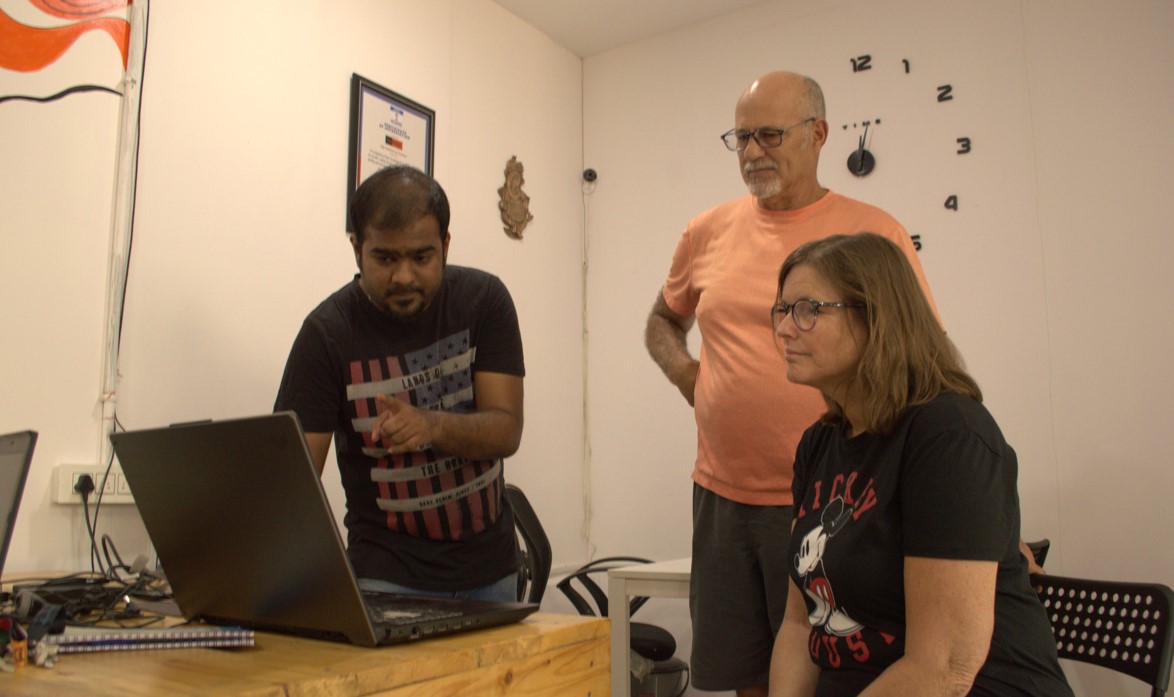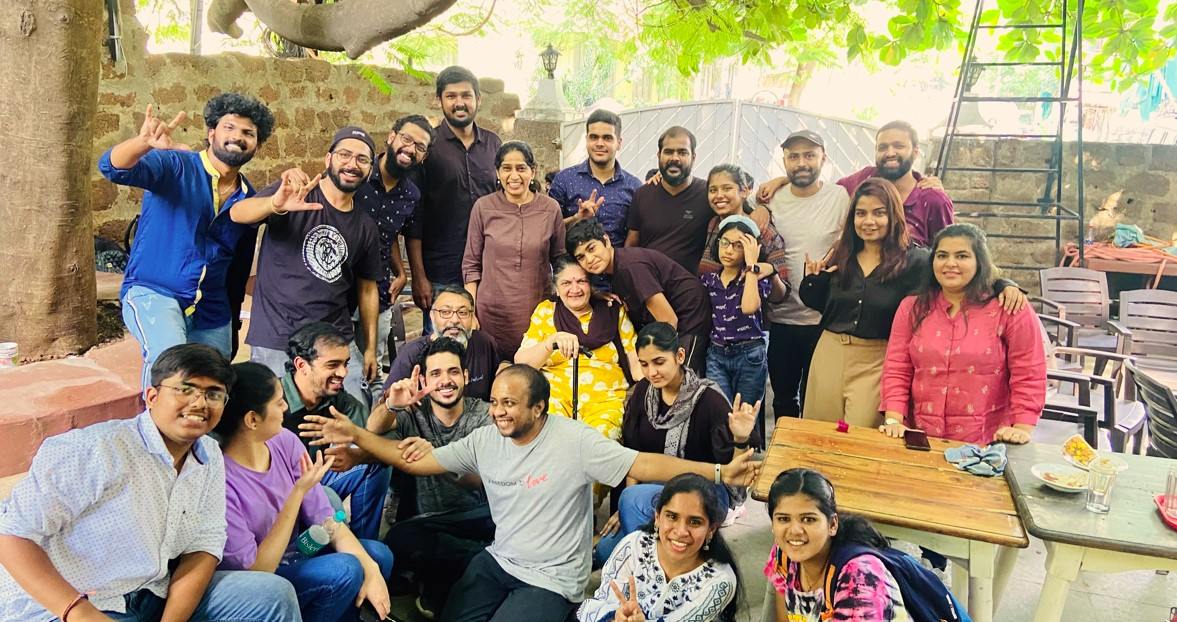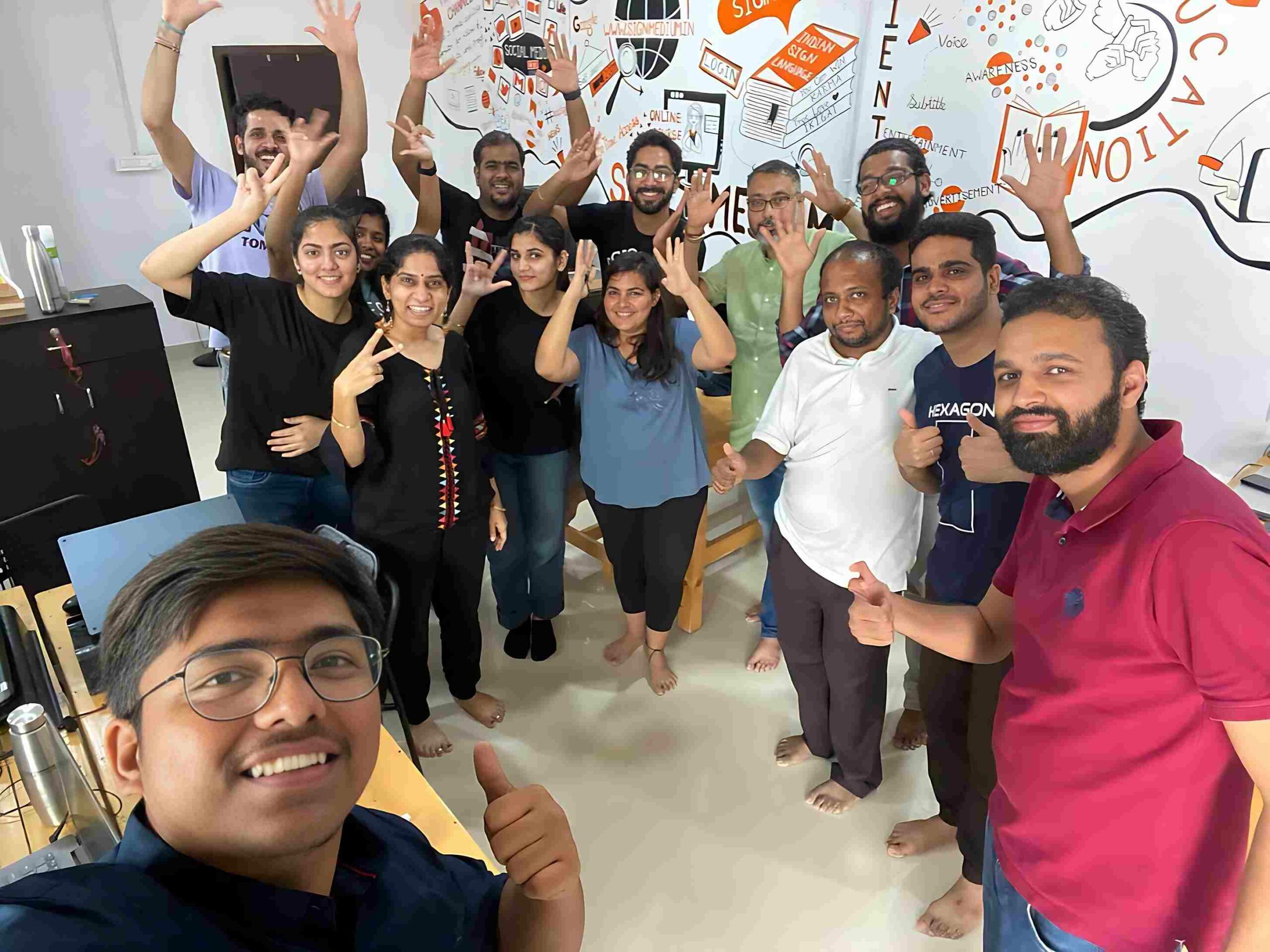Indian Sign Language (ISL) was the first language Nita Gopalakrishnan learnt. English was second. Born to deaf parents but being able to hear perfectly well herself shaped Nita’s formative years, and changed her perspective of the world, as she saw it through her parents’ eyes.
In 2020, the 42-year-old founded Yunikee — a Hyderabad-based organisation dedicated to helping persons with hearing disabilities in India — with her husband Chaithanya Kothapalli (44) and her colleague Rahul Jain (34).
“I never saw my parents as being different from other parents,” Nita shares. “To me, it was just a matter of my parents not being able to hear.”
Being a special educator, Nita realised the inaccessibility of resources that deaf children often faced, a realisation that later served as her driving force to co-found Yunikee.
For Chaithanya, an IT professional, it was watching his wife Nita’s work ethic while she taught deaf kids, which had a profound impact on him. So, after a 25-year-long stint in the corporate world, Chaithanya quit his job in 2020 to join Nita in creating the social impact platform.
Joining their vision was Rahul, an ISL teacher who had been working with Nita since 2017 teaching deaf kids in special schools. Being deaf, Rahul brought unique insights to the table on how they could formulate a platform that would cater to solving some vital problems that the community was experiencing.

A conversation sparks an idea
It is not every day that three people from very different walks of life bond over an idea. As Chaithanya, Nita and Rahul share the story of Yunikee’s inception, they are well aware of the incredible alignment of thoughts, among other things.
“It was thanks to the COVID-19 pandemic,” says Chaithanya. The trio was discussing the unfairness of the situation — how abled students had the privilege of continuing their schooling online while students with hearing disabilities were denied this basic right. They figured that this discrimination extended beyond the classroom.
“What if we were to start a platform that enabled hearing disabled people to access equal opportunities in terms of jobs, skillset training and more?” they thought.
“That’s where it all started,” Chaithanya shares. And there was no looking back.
“Yunikee is an actual word (in Telugu) that translates to ‘I exist. Don’t ignore me.’” The reason for this stark reminder is that, unlike people of other disabilities, deaf persons cannot be identified unless one speaks to them, says Chaithanya.
He continues, “Through Yunikee, we wanted to bring an identity to them.”
As the trio dived deeper into the project, the most enthusiastic of them was Rahul. From personal experiences, Rahul’s views were cemented in the fact that the people of his community were not given the right tools that they needed to excel. He shares that there were “close to no learning platforms for deaf people at all”.
Yunikee, he says, addresses this gap by empowering deaf adults to free themselves from the chokehold of dependency.
“We are simply forced to continue our family business because of a lack of options in the job market. As someone who would scour the job market looking for jobs, and now as someone who is part of an initiative that trains deaf people to be adept at what they do, I have seen both ends of the spectrum,” Rahul says. “Yunikee enables us to be independent.”
Championing change through campaigns
Yunikee has extended its services to over “50,000 deaf persons” across India through the wide gamut of activities, projects and campaigns that it conducts.
Take, for instance, the ‘Sign Medium’. Over “10,000 deaf adolescents” have been taught sign language through this programme, which started in 2020. Chaithanya recalls, “We ran a social media campaign inviting those interested in learning ISL to register.”
The response from this initiative was so overwhelming that Yunikee now conducts over 120 different courses such as stock trading, web development, IELTS and more for their participants today.
Dibyendu, along with his parents, was part of one of these workshops conducted by Nita last year. “It was a very nice experience to learn sign language and be able to communicate freely. Earlier, I was only able to do some gestures and was not able to express myself freely. Now I can communicate with my family and deaf friends,” he shares. The 25-year-old is now working in the web development sector and is extremely happy with his prospects.
What sets Yunikee apart is that the impact is multi-faceted, extending beyond a single participant. For instance, their ‘Champions League’ programme helps deaf people looking to start ventures of their own. By assisting them with workshops in sign language, completing legal formalities, and chartered accountancy services, the team ensures that they are well-equipped with everything they need to know before starting their business.

The first cohort of the Champions League programme is ongoing, and Chaithanya shares that of the nine business ventures so far, three startups are already up and running. One of them is ‘Sign Skill Bridge’ founded by Vishnu Prasath from Madurai, Tamil Nadu.
Sharing how the business incubation programme helped him, he says he owes it to the networking he was able to do in the past three months. “I have been learning a lot. Following step-by-step instructions, I successfully set up the ‘Sign Skill Bridge’ as a centre.”
Encouraging others to also avail of it, Vishnu says that “the programme covers various courses that have made start-up and business establishment accessible for the deaf community entrepreneurs for the first time in India”.
He adds that he is excited to see how it unfolds.
Though Vishnu had the idea for ‘Sign Skill Bridge’ for years, he never had the confidence to share it with the world due to communication barriers. But in 2022, a meeting with Yunikee opened him up to the world of possibilities.
Today his learning centre empowers over 150 deaf persons with its inclusive classroom where courses such as web development, 3D painting, graphic designing and more are taught.
Vishnu’s story reminds Chaithanya of the tremendous impact Yunikee has had on the people they have worked with. “Every time I doubt if we are on the right path, I think of Vishnu’s story and see it as a reminder to keep going.”
Preparing for life – and more

A unique aspect of Yunikee’s work is the partnerships they conduct. One such project in 2022 trained 10 deaf girls in Pakistan in hairdressing and applying makeup. These girls then went on to set up their individual parlours, says Nita.
While enabling deaf persons to access mainstream jobs is one pillar, the other is enabling them to access what is duly theirs. Yunikee has successfully trained over 140 deaf people to appear for government exams, out of which, 40 of them have secured jobs.
“Despite there being a one percent reservation in government sectors for deaf people, these positions often go vacant as the candidates are unable to clear the exams,” Nita explains. “That’s where we come in.”
Anil Mishra, who took the course last year on banking using sign language, is now working at a bank in Ahmedabad. He says the nine months he spent learning were worth it and helped him clear the IBPS exam. “While there was always a one percent reservation for deaf people in banks, we had no support in learning and preparing for the exams.”
He gives the success of his credit to Sagar, who is one of the 40 team members at Yunikee who teach, mentor and formulate these programs. “Sagar sir taught us all the topics in detail enabling me to confidently take the exam which led to my selection.”
Nita shares that apart from her and Chaithanya, the team of 40 comprises deaf adults, each of whom brings in their own expertise and individual insights that contribute to making the platform a holistic learning space. “Being deaf themselves, they have lived experiences and have an understanding of what is needed,” she says.
As the trio recounts several gratifying moments through Yunikee’s journey, their stories are tinged with a deep sense of satisfaction as well as a need for advocacy. “There are still miles to go,” says Nita, echoing the thoughts of the other two.
Edited by Padmashree Pande
No comments:
Post a Comment